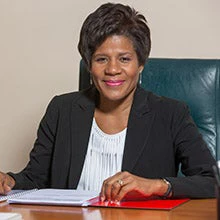 World Bank Country Director Marie-Francoise Marie-Nelly is joined by the Botswana Minister of Energy Lefoko Moagi, Masen CEO and President Mustapha Bakkouy and South Africa City Support Program Manager Sibongile Mazibuko during a recent trip to Morocco.
World Bank Country Director Marie-Francoise Marie-Nelly is joined by the Botswana Minister of Energy Lefoko Moagi, Masen CEO and President Mustapha Bakkouy and South Africa City Support Program Manager Sibongile Mazibuko during a recent trip to Morocco.
At the beginning of March, before lockdown from the global coronavirus (COVID-19) pandemic, I visited Rabat, the capital of Morocco, a place that was my home for four years from mid-2015 to mid-2019, when I was the World Bank Country Director for the Maghreb and Malta.
This time, I was back for a short stint, visiting with government counterparts from my new home in Southern Africa. We were there on a study-tour to learn from Morocco’s experience in renewable energy. A country heavily reliant on oil import, Morocco has set ambitious targets for renewables, aiming to generate up to 52% of its energy from renewables by 2030.
I was joined on this visit by delegates from Botswana and South Africa, countries where the sun shines for much of the year leading to a great solar potential as a viable alternative source of energy. The tour was organized as part of the World Bank’s commitment to promoting cross-country learning and supporting the efforts of countries to move towards a green energy future, in line with the Paris Climate Agreement.
Tour participants were able to see what Morocco, which built Noor Ouarzazate, the world’s largest multi-technology solar power complex with a 580MW production capacity, has achieved to diversify its energy mix. The complex provides power to more than one million people and operates at full capacity, putting Morocco on track to meet its intermediary objective of 42% installed renewable capacity by end-2020.
The delegates were able to see firsthand how Morocco has optimized, in a very innovative way, the use of technology by mixing, photovoltaic technology to harness the sun during the day and concentrated solar power to provide electricity after sunset, thanks to storage. The delegates had also the opportunity to visit the Tangier 1 wind farm and learn about this plant which has been in operation for almost a decade. The visit to the Siemens-Gamesa local factory of wind blades shed light on the manufacturing of wind equipment for both local and export markets.
This study tour helped to share valuable lessons from Morocco and kick-start a fructuous dialogue on a possible partnership on sustainable renewable energy projects.
For me personally, being back in Morocco was a great pleasure and in particular I was encouraged by how the country has kept up its momentum on increasing its renewable energy capacity, fostering innovation and opening up to the private sector. I left with the hope that building on the lessons learned from Morocco could benefit the Southern African countries, which are endowed with exceptional solar and wind resources that they can use as a catalyst for their socio-economic development.
Since this study tour, much has happened to change the world as we know it. Tragically, the people of South Africa, Morocco and much of the world is dealing with the challenges brought on by the COVID-19 pandemic. So, let me end by sending wishes of health, safety and strength to everyone in these difficult times. I would also like to express our commitment as the World Bank Group in supporting governments to cope with the health and economic impacts of this pandemic.
We are in this together!


Join the Conversation